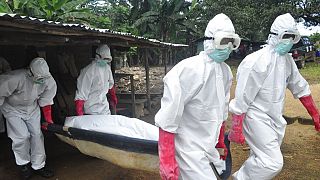Guinea
The WHO said Friday that no further Marburg cases have been identified so far in Guinea but contacts of the fatal case were being monitored twice daily during the critical incubation period.
West Africa's first recorded case of the lethal virus, which is related to Ebola, was confirmed on Monday.
The virus, which is carried by bats and has a fatality rate of up to 88 percent, was found in samples taken from a patient who died on August 2 in Guinea's southern Gueckedou prefecture.
"So far, there are no further cases of Marburg since the index case," World Health Organization spokeswoman Fadela Chaib told reporters in Geneva.
She said that as of Friday, 150 contacts of the fatal case had been identified.
The incubation period of the virus -- the interval from infection to onset of symptoms -- varies from two to 21 days.
"We have entered the critical time period during which anyone exposed to the virus would be most likely to develop symptoms. This makes surveillance especially important right now and teams are monitoring contacts twice a day. Screenings for suspect cases are also ongoing," Chaib said.
"Efforts are ongoing to find people who may have been in contact with the patient."
The discovery comes just two months after the WHO declared an end to Guinea's second outbreak of Ebola, which started last year and claimed 12 lives.
Although Marburg and Ebola are members of the same family, they are different viruses and can only be differentiated through laboratory testing.
Early rehydration and symptomatic treatment improves the chances of survival.
There is no licensed treatment proven to neutralise the virus, but a range of blood products, immune therapies and drug therapies are under development, said Chaib.











01:04
South Africa reports new bird flu outbreak on poultry farms
01:05
Study finds millions of children at risk as global vaccine rates fall
Go to video
Over 40 killed in attack on Sudanese hospital: WHO Chief condemns “Appalling” strike
01:48
South Africa launches vaccination drive to combat foot-and-mouth disease outbreak
Go to video
Ghana confirms 34 new Mpox cases, total rises to 79
01:07
WHO says the mpox outbreak remains a public health concern